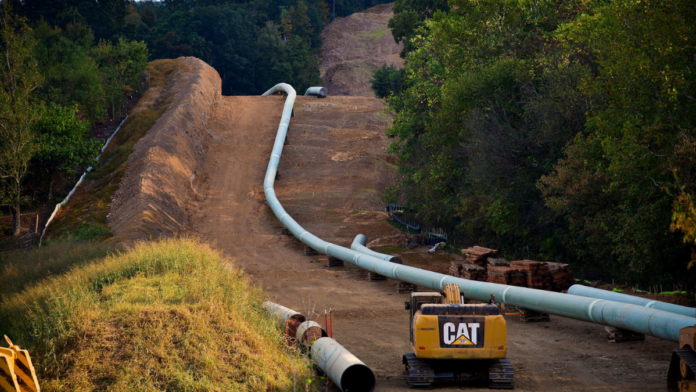More than 80 members of the U.S. House sent a bipartisan letter to U.S. Attorney General Jeff Sessions and the Department of Justice asking for a review of legislation and prosecutorial action covering attacks on the country’s pipeline infrastructure.
Led by Rep. Ken Buck (R-Colo.) and Rep. Kevin Cramer (R-N.D.), the letter seeks DOJ input on the adequacy of federal statutes like the Patriot Act and Pipeline Safety Act in allowing the department to “prosecute criminal activity against energy infrastructure at the federal level.”
“Multiple media sources have reported recent attempts to disrupt the transmission of oil and natural gas through interstate and international pipeline infrastructure,” the House members wrote. “In some instances individuals have used blow torches to burn holes in pipelines or promoted violence against oil and gas company employees.”
“In April, a newspaper in Colorado went as far as publishing a letter to the editor that stated, ‘If the oil and gas industry puts fracking wells in our neighborhoods, threatening our lives and our children’s lives, then don’t we have a moral responsibility to blow up wells and eliminate fracking and workers?’” the letter stated.
Western Wire was first to report on the letter to the editor, published in the Boulder Daily Camera, quoted in the House letter to Sessions. Western Wire’s quick reporting captured the first rendition that appeared with the inflammatory language against oil and gas workers and facilities but was subsequently edited, followed by bipartisan public denunciations.
“Our country is home to an intricate web of interstate and cross-border pipelines that transport the oil and gas that power our communities, offices, and vehicles,” Congressman Vicente Gonzalez (D-Texas) told Western Wire via email. “Operating this vital infrastructure requires extensive training and attentive personnel. Disrupting or tampering with an active pipeline could have damaging effects on our communities, endanger workers, and inhibit our access to energy. And while I encourage all Americans to assert their First Amendment rights, I encourage them to do so in a safe and peaceful way.”
Gonzalez was joined by fellow Texas Democrats Rep. Filemon Vela and Rep. Henry Cuellar. Representatives from states across the West including Reps. Liz Cheney (R-Wyo.), Steve Pearce (R-N.M.), Markwayne Mullin (R-Okla.), Greg Gianforte (R-Mont.), Paul Gosar (R-Ariz.), and Bob Bishop (R-Utah) were among those signed on to the letter.
“Environmental activists who choose to use violence against our nation’s energy infrastructure and the men and women who work in the energy industry should be prosecuted to the full extent of the law,” Buck said in a statement. “While I will continue to support their right to protest policies they disagree with, we need to send a strong message to those who destroy property that such dangerous behavior will not be tolerated by the communities who live around and rely on this energy infrastructure.”
In August the builder of the Dakota Access Pipeline (DAPL), Energy Transfer Partners, filed a lawsuit in the United States District Court for the District of North Dakota against anti-fossil fuel organizations and individuals, alleging the activist groups “incited, funded, and facilitated crimes and acts of terrorism.”
The lawsuit specifically named two members of Mississippi Stand, Jessica Reznicek and Ruby Montoya, alleging the individuals “issued a call to action for others to follow in their violent and terrorist actions, and have provided a blue print for arson and property destruction.”
Reznicek and Montoya issued a statement in July defending what they called “non-violent direct action,” including “arsonry as a tactic” against DAPL and related property.
“On election night 2016, we began our peaceful direct action campaign to a Dakota Access construction site and burned at least 5 pieces of heavy machinery in Buena Vista County, IA,” said Reznicek and Montoya. “We recognize that our action wasn’t much, but we at least stopped construction for a day at that particular site.”
The Mississippi Stand members detailed the use of torches to destroy pipeline equipment, without consideration of possible dangerous outcomes.
“We then began to research the tools necessary to pierce through 5/8 inch steel pipe, the material used for this pipeline. In March we began to apply this self-gathered information. We began in Mahaska County, IA, using oxy-acetylene cutting torches to pierce through exposed, empty steel valves, successfully delaying completion of the pipeline for weeks,” the protesters said. “After the success of this peaceful action, we began to use this tactic up and down the pipeline, throughout Iowa (and a part of South Dakota), moving from valve to valve until running out of supplies, and continuing to stop the completion of this project.”
“Water is Life, oil is death,” said Reznicek and Montoya.
“When an individual burns a hole through a pipeline currently in operation, there is a high probability this could ignite the contents, killing not only the perpetrator but other innocent victims. It also has the potential to cause property and environmental damage, as well as disrupt services to communities and consumers,” the House members wrote.
“Even though some activists commit these acts of sabotage to raise awareness about climate change, they only create the serious risk of harm to the environment they claim to care about,” they went on to say.
A coordinated disruption by climate change activists in October 2016 targeting pipelines across four states—Washington, Montana, Minnesota, and North Dakota—prompted a request for information on “prosecutorial or investigative action” undertaken by the DOJ since the attack.
Improperly shutting down pipelines or other tampering could lead to dangerous ruptures or leaks, officials said.
“Tampering with energy infrastructure is a dangerous activity and it could cause harm to citizens and surrounding communities, which is unacceptable,” Canadian Energy Minister Jim Carr told Reuters after the October incidents.

